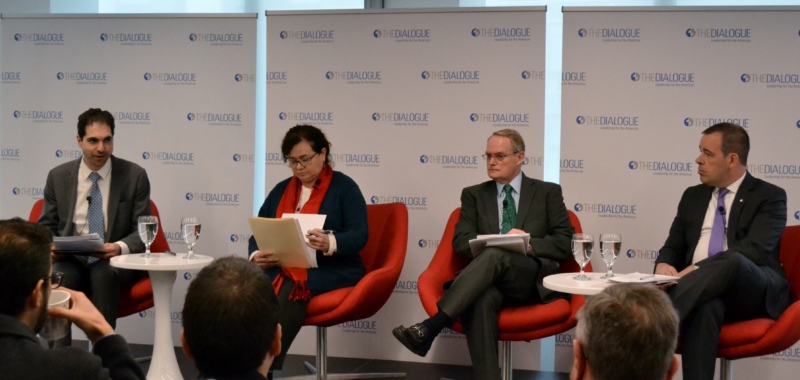The Explosive Growth of Private Security in Latin America
 Irene Estefanía González / Inter-American Dialogue
Irene Estefanía González / Inter-American Dialogue
On March 27, the Inter-American Dialogue in partnership with the Embassy of Switzerland in Washington, D.C. hosted an event titled “The Explosive Growth of Private Security in Latin America.” This discussion, moderated by Michael Camilleri from the Dialogue, featured panelists Claudia Paz y Paz from the Organization of American States, Eric Tardif from the International Committee of the Red Cross (ICRC), and Adam Blackwell from the Development Services Group. This discussion drew from a report recently published by the Dialogue titled, “Security for Sale: Challenges and Good Practices in Regulating Private Military and Security Companies in Latin America,” co-authored by Sarah Kinosian and James Bosworth.
Ambassador Martin Dahinden, from the Swiss embassy, offered opening remarks about the significance of the Montreux Document, an international document authored the Swiss government and ICRC. This document reaffirms the legal norms, obligations, and good practices which states should follow in their use of private military and security services (PMCs). According to Dahinden, this non-binding document has support from fifty-four state signatories and three intergovernmental organizations.
Paz y Paz highlighted important aspects of the report while reminding the participants that “citizen security is a public good.” The growing prevalence of private security firms in public safety are diverting from the state’s primary responsibility as the guarantor of security. This does not mean that PMCs’ growth is devoid of norms and regulations; such measures exist in Latin American countries. The problem is that governments are not enforcing or evaluating these policies. However, Paz y Paz noted that the growing demand for security services in an unregulated market will continue to lead to negative repercussions.
“In most cases, the private security companies do not want public security—they have no incentive to contribute to it.”
— The Inter-American Dialogue (@The_Dialogue) March 27, 2018
-@adamblackwell3 #PMSCDialogue pic.twitter.com/B6TTD9BXOp
Tardif from the ICRC discussed the origins and intentions of the Montreux Document. This document, first and foremost, addresses the misperception that PMCs can operate in a legal vacuum. The ICRC noticed the growing trend in PMCs universally and embarked on an initiative to understand the phenomenon. While the document is a legally non-binding instrument, its signatories signal their affirmation in observing international obligations and human rights within their country’s respective PMCs markets. For the ICRC, Tardif acknowledged that it was largely examined under the context of PMCs in armed conflict, but is relevant to Latin American countries in situations of non-armed conflict.
Blackwell analyzed the applicability of the best practices recommendations set forth by the report and document. For Latin American governments, each must individually decide which practices apply best within existing circumstances. In addition, the challenge with the Montreux Document is its unenforceability and inapplicability in the region. To propel this issue, the document must be translated into the inter-American system, such as bodies like the Organization for American States, where mechanisms for peer-review and implementation may be presented. Blackwell further emphasized that we should not forget that the public security infrastructure continues to suffer with the growth of PMCs. This phenomenon is reducing incentives to invest in public security and military architecture, creating disparities between socioeconomic groups.
As Ambassador Dahinden mentioned in his opening remarks, the Montreux Document is a “contribution, not a solution” to a challenge which continues to evolve. Blackwell and the other panelists further acknowledged that private security will not go away. It can play a constructive role that does not threaten the need for investment in public security.



















